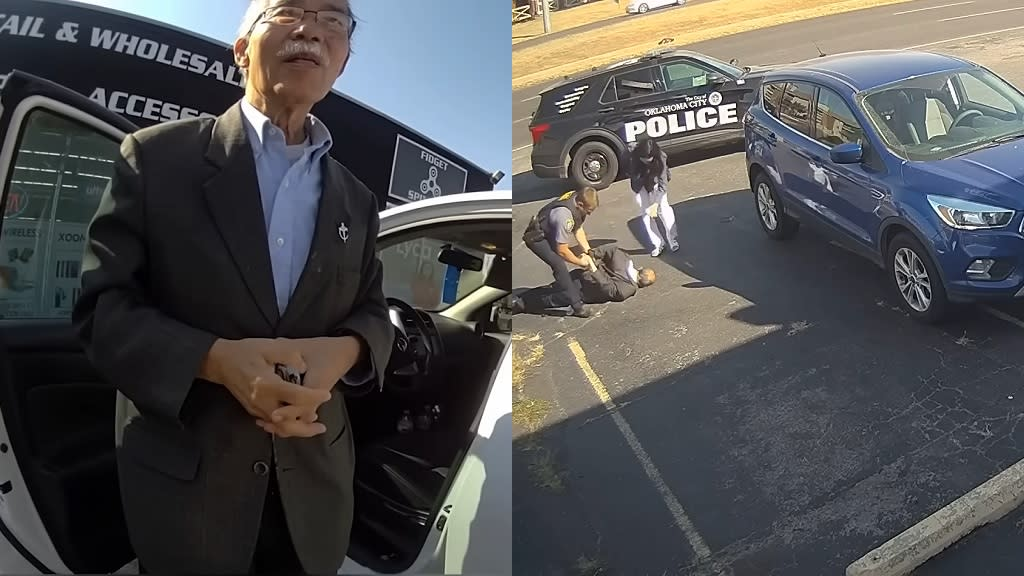Shocking footage has emerged online, capturing a distressing encounter between a 70-year-old man with bone cancer and an Oklahoma police officer accused of using excessive force. The incident, which has sparked outrage and demands for justice, underscores the critical need for accountability in law enforcement.
The Incident: Routine Traffic Stop Turns Violent

On October 27, Oklahoma City Police Officer Joseph Gibson pulled over 70-year-old Lich Vu for an alleged illegal U-turn on the NW 39th Expressway. What began as a routine traffic stop quickly escalated into a harrowing event that left Vu hospitalized with severe injuries.
The released body-camera footage shows Vu, seated in his car with his wife, calmly disputing the claim. “I didn’t U-turn,” he stated, explaining that another driver hit his car. The disagreement intensified as Officer Gibson insisted on issuing a citation, warning Vu that failure to sign would result in arrest. Vu, clearly frustrated, responded, “I’m ready to go to jail,” setting the stage for the alarming confrontation.
The Violent Arrest: A Harsh Response to a Minor Infraction
As tensions flared, Vu exited his car to explain the situation. The officer, however, dismissed further discussion, stating, “We argue in court.” The encounter took a dramatic turn when Vu seemingly tapped Gibson’s chest and told him to “shut up.” This prompted Officer Gibson to grab the elderly man’s arm, twist it behind him, and forcefully pin him to the ground.
Surveillance footage from a nearby shop captured the devastating moment Vu’s head hit the pavement as he was handcuffed. The impact resulted in a brain bleed, necessitating surgery. Vu, who also suffers from bone cancer, remains hospitalized, drifting in and out of consciousness. His family described his condition as stable but critical.
Community Outrage: Calls for Justice and Accountability
The incident has ignited widespread condemnation, with community leaders and activists demanding action. Thuan Nguyen, president of the Vietnamese American Community of Oklahoma, has been vocal in his call for Officer Gibson’s termination. “We don’t want our police department nor our district attorney to take it lightly. We want justice to be served,” Nguyen stated.
Nguyen also highlighted a broader issue of implicit bias within law enforcement, suggesting that marginalized communities often feel unheard or disregarded in such situations. “We are always the last to be heard,” he explained, emphasizing the need for systemic change.
The Police Response: Investigation Underway
In the wake of public outcry, the Oklahoma City Police Department placed Officer Gibson on administrative leave and launched an internal investigation. A statement released on the department’s Facebook page stressed their commitment to transparency and accountability. “We want our community to know that this case is being thoroughly investigated, and the review process will take time to complete,” it read.
While the department’s actions suggest a willingness to address the issue, the incident has reignited debates about police practices, particularly in interactions with vulnerable individuals.
The Human Toll: Impact on Vu and His Family
For Vu and his family, the ordeal has been nothing short of devastating. A routine traffic stop turned into a life-altering event, leaving him with severe injuries and uncertain recovery prospects. His hospitalization has also brought financial and emotional strain to his loved ones, who are now advocating for justice on his behalf.
The Broader Implications: Excessive Force in Policing
This incident raises critical questions about the use of force in policing. Was such a violent response warranted for a minor traffic violation? What safeguards exist to prevent similar occurrences, especially when dealing with elderly or medically vulnerable individuals?
Excessive force incidents like this not only erode public trust in law enforcement but also highlight the urgent need for better training and oversight. Advocates are calling for enhanced de-escalation training, stricter accountability measures, and greater community involvement in shaping policing policies.
A Systemic Issue: Addressing Implicit Bias
The confrontation has also shone a spotlight on implicit bias within law enforcement. As Nguyen pointed out, marginalized communities often feel sidelined in the justice system. Addressing these biases is critical to ensuring fair treatment for all, regardless of race, ethnicity, or socioeconomic status.
Moving Forward: Demands for Change

As the investigation into Vu’s case unfolds, community leaders and activists continue to press for systemic reforms. Their demands include:
- Accountability for Officer Gibson: Calls for his dismissal reflect a broader push for zero tolerance toward excessive force.
- Policy Reforms: Advocates are urging police departments to adopt stricter guidelines on the use of force, particularly in non-violent situations.
- Transparency in Investigations: Ensuring that such cases are handled openly and fairly is key to restoring public trust.
Conclusion: A Call for Justice and Reform
The harrowing footage of a 70-year-old man with bone cancer being slammed to the ground by an Oklahoma police officer serves as a stark reminder of the challenges in modern policing. While the investigation offers hope for accountability, the incident underscores the need for systemic change to prevent similar tragedies.
As Vu’s family and the community await the investigation’s outcome, their fight for justice has become a rallying cry for fairness, transparency, and humanity in law enforcement. This case is more than a single act of violence—it’s a call to action for a society that values dignity and respect for all.


